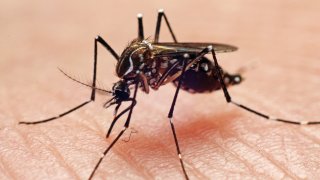
On April 8, the Dallas County Health and Human Services (DCHHS) reported its first human case of West Nile Virus (WNV) infection in Dallas County for 2022.
Officials say the patient is a male resident of the 75219 zip code in Dallas and was diagnosed with West Nile Neuroinvasive Disease (WNND.)
Due to privacy and confidentiality reasons, DCHHS does not disclose personal information about the patient.
WNV is a disease that is spread by the bite of an infected mosquito. Mosquitoes can become infected when they feed on the blood from infected birds.
Get DFW local news, weather forecasts and entertainment stories to your inbox. Sign up for NBC DFW newsletters.
The infected mosquitoes can then transmit WNV to humans and animals. Severe WNV infections can cause neurologic complications such as encephalitis.
“We are in the early stages of WNV season and must start thinking about the possible threat that West Nile Virus poses to our community as people go outside to enjoy outdoor activities,” said Dr. Philip Huang, DCHHS Director.
Although there is no vaccine to prevent the infection, Huang suggests that the best way to prevent West Nile is by remembering to use the 4 D's to protect you from getting bit:
- DEET: Whenever you’re outside, use insect repellents that contain DEET or other EPA-approved repellents and follow instructions.
- DRESS: Wear long, loose, and light-colored clothing when outdoors.
- DRAIN: Drain or treat all standing water in and around your home or workplace where mosquitoes could lay eggs.
- DAWN to DUSK: Limit your time outdoors during these times when mosquitos are most active.
According to the CDC, about 1 in 5 people who are infected develop a fever with symptoms including headache, body ache, joint pains, vomiting, and diarrhea or rash.
Local
The latest news from around North Texas.
For more information, visit the DCHHS website: https://www.dallascounty.org/departments/dchhs/westnile.php.



